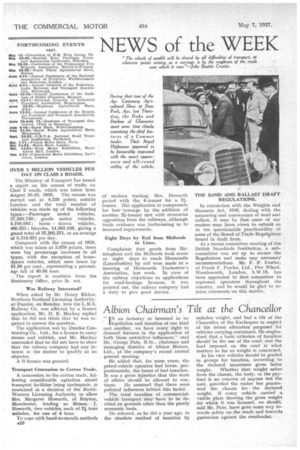Albion Chairman's Tilt at the Chancellor
Page 30

If you've noticed an error in this article please click here to report it so we can fix it.
" IN an industry so hemmed in by
legislation and taxation of one kind and another, we have every right to demand fairness in the application of both these restrictive influences," said Mr. George Pate, B.Sc., chairman and managing director of Albion Motors, Ltd., at the company's recent annual general meeting.
He added that, for some years, the petrol-vehicle operator had borne, proportionately, the brunt of fuel taxation. It was a gross injustice that this state of affairs should be allowed to continue. He assumed that there were political influences behind this factor.
The total taxation of commercialvehicle transport may -have to be decided on grounds other than the purely economic basis.
He referred, as he did a year ago, to the obsolete method o# taxation by
unladen weight, and had a tilt at the Chancellor of the Exchequer in respect of the minor alteration proposed for vehicles carrying containers. He emphasized that a basic criterion of taxation should be the use of the road, and the load imposed on the road is what matters so far as weight is concerned.
In his view vehicles should be graded in groups for taxation, according to the declared maximum gross laden weight. Whether that weight arises from the chassis, the body, or the payload is no concern of anyone but the user, provided the maker has guaranteed the chassis or the declared weight. If every vehicle carried a visible plate showing the gross weight for which it was licensed, we should, said Mr, Pate, have gone some way towards safety on the roads and towards protection against the overloader.




















































































